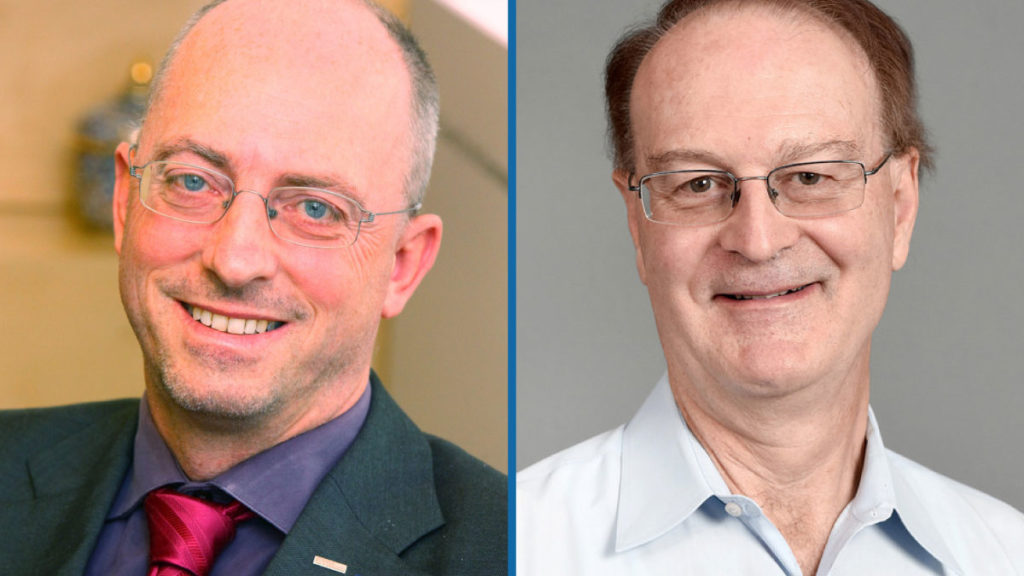heading
2018: Professors Bruce Rittmann and Mark van Loosdrecht
Professors Bruce Rittmann and Mark van Loosdrecht are named the 2018 Stockholm Water Prize Laureates for revolutionizing water and wastewater treatment. Their pioneering microbiological-based technologies have led to a new generation of energy-efficient water treatment processes, which are being deployed Worldwide.

Their innovative microbiological water treatments not only remove harmful contaminants from wastewater, they cut treatment costs, reduce energy consumption, and even recover chemicals and nutrients for recycling.
Mark van Loosdrecht is Professor in Environmental Biotechnology at Delft University of Technology, The Netherlands. Bruce Rittmann is Regents’ Professor of Environmental Engineering and Director of the Biodesign Swette Center for Environmental Biotechnology at the Biodesign Institute, Arizona State University, USA.
In its citation, the Stockholm Water Prize Nominating Committee recognizes Professors Rittmann and van Loosdrecht for “pioneering and leading the development of environmental biotechnology-based processes for water and wastewater treatment. They have revolutionized treatment of water for safe drinking, and refined purification of polluted water for release or reuse – all while minimizing the energy footprint”.
On receiving news of the prize, Professor van Loosdrecht said: “I’m very excited and pleased! This is a recognition not just of our work but of the contributions microbiological engineering can make to the water sector”. Whilst Professor Rittman said “Traditionally, we have just thought of pollutants as something to get rid of, but now we’re beginning to see them as potential resources that are just in the wrong place.”
“Traditionally, we have just thought of pollutants as something to get rid of, but now we’re beginning to see them as potential resources that are just in the wrong place. ”
Professor Rittman has studied how microorganisms can transform organic pollutants to something of value to humans and the environment. “We’re in the middle of a paradigm shift, with more and more focus on how we can create resources, using microbial systems,” he says.
Professor van Loosdrecht’s work echoes this sentiment. His research has led to increasingly common wastewater treatment processes which are less costly and more energy efficient than traditional methods. “With current technology, you can already be energy neutral and there is a lot of research on how to become energy positive. Especially in developing countries with unstable electricity supply and limited access to funding, this is very important. If we could build a wastewater plant that is self-sufficient in energy, that would make sewage plants feasible in many more places,” he says.
“Together, Professors Rittmann and van Loosdrecht are leading, illuminating and demonstrating the path forward in one of the most challenging human enterprises on this planet – that of providing clean and safe water for humans, industry, and ecosystems,” says SIWI’s Executive Director Torgny Holmgren.
“We’re in the middle of a paradigm shift, with more and more focus on how we can create resources, using microbial systems.”
Interview with Bruce Rittmann and Mark van Loosdrecht
More about Professor Rittmann
Professor Rittmann has written over 650 peer-reviewed scientific papers and co-authored the textbook Environmental Biotechnology: Principles and Applications with Professor Perry McCarty (the 2007 Stockholm Water Prize Laureate). He is the inventor of the membrane biofilm reactor (MBfR), a commercially available technology which uses naturally occurring microorganisms to remove contaminants such as perchlorate and tricloroethene from water.
Professor Rittmann has received many accolades during his career. These include being named a fellow of the International Water Association, National Academy of Inventors, and American Association for the Advancement of Science; and he is a member of the U.S. National Academy of Engineering and a Distinguished Member of the American Society of Civil Engineers.
More about Professor van Loosdrecht
Professor van Loosdrecht’s research has been key to developing the Anammox and Nereda technologies for wastewater treatment. The Anammox process is a resource efficient way to remove nitrogen from wastewater, resulting in an energy producing treatment process.
The Nereda technology is based on granulation of bacteria, providing a cheap and simple municipal wastewater treatment process. A Nereda plant is significantly more compact and energy efficient (by up to 50%) than a conventional plant. In addition, recovery of high performance biopolymers from the ‘waste’ sludge can contribute to a more circular economy.
Professor van Loosdrecht has been awarded several prizes, including the 2014 Spinoza Prize and the 2012 Lee Kuan Yew Prize. He is chief editor of the scientific journal Water Research and a member of the Royal Netherlands Academy of Arts and Sciences and of the Dutch and USA National Academies of Sciences.